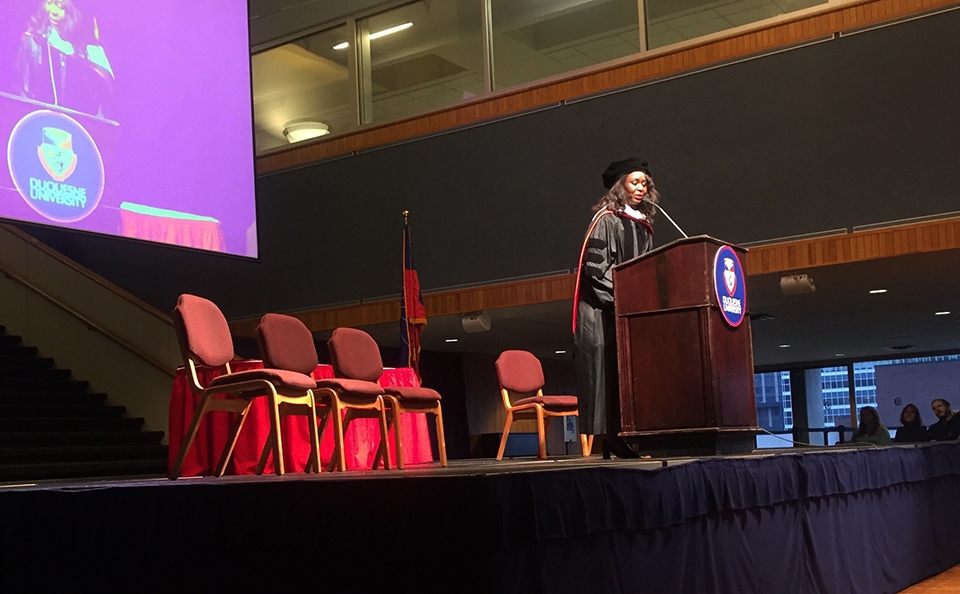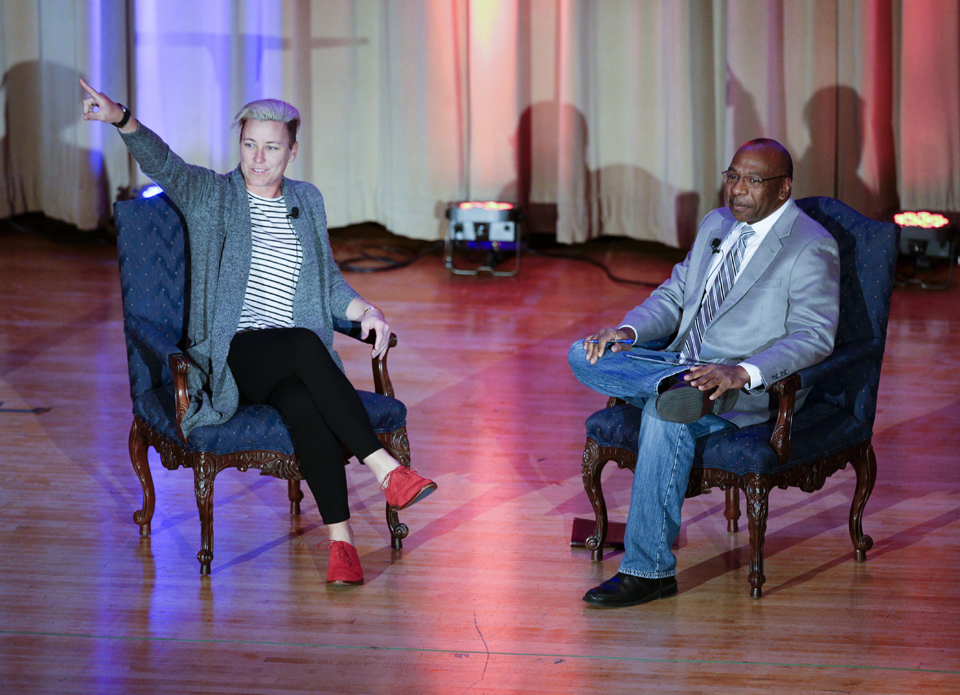
Immaculée Ilibagiza shares her story about how she survived the 1994 Rwandan genocide with a DU audience.

Immaculée Ilibagiza shares her story about how she survived the 1994 Rwandan genocide with a DU audience.
Gabriella DiPietro | Asst. News Editor
04/05/18
In 1994, while those of the Tutsi community in Rwanda feared for their lives and were mercilessly slaughtered by the majority Hutu government, Immaculée Ilibagiza and seven other women spent 91 days crammed in a 3-by-4-foot bathroom — surviving it all.
Duquesne issued a warm welcome to Ilibagiza on Tuesday, April 3, in the Union Ballroom, where she shared a story of not only survival, but of faith, hope and forgiveness.
According to Anna Tang, program assistant of the Center for African Studies at Duquesne, the Center for African Studies tries to hold an event to commemorate the genocide in Rwanda every spring.
“The idea came about because I had seen her speak twice while in college,” said Tang. “I also thought that Immaculée’s story, history and biography fit well with Duquesne’s history and mission.”
The event began with welcoming remarks from Gerald M. Boodoo, Ph.D., the director of Duquesne’s Center for African Studies, followed by an invocation from the Rev. Jeffrey Duaime, C.S.Sp.
Before taking the stage to tell her story, Ilibagiza received an honorary degree of Doctor of Humane Letters, honoris causa, from Duquesne. The degree was presented by John R. McGinley, chair of the Duquesne University Board of Directors; Timothy R. Austin, provost and vice president for academic affairs; and Ken Gormley, president of the university.
“Often the recipients of these awards are ordinary people who have made extraordinary contributions in a given field, to a community or to humanity as a whole. They are individuals who tell remarkable stories, and whose experiences should be more widely known,” McGinley said. “[Ilibagiza] may be the most inspirational of the honorary degree recipients that I have ever had the privilege of participating in a ceremony with.”
The audience fell silent as Ilibagiza took the stage, explaining how she was merely a college student when the Rwandan president’s plane crashed and the genocide began.
With death and violence surrounding her, she found shelter at the home of a nearby pastor, who was of the Hutu community. There, she and seven other women, ranging from the age of 7 to 75, hid silently for 91 days, never knowing each other’s names or if they would live to see the next day.
During that time, Ilibagiza lived off of the leftovers of the pastor’s children, who were unaware of the eight women hiding in one of their bathrooms after being told that their father had simply lost the key to the room.
She constantly grappled with her faith, though she prayed the rosary 27 times a day, beginning at 6 a.m. and ending at 10 p.m. She explained that praying was the only thing that brought her peace.
When she caught a glimpse through the bathroom window of the 300 to 400 marauders that came to search the home where she was hidden, she begged God to protect her and prevent her from being found.
According to Ilibagiza, after the Hutu men searched everywhere, they came right to the door of the bathroom in which she was hidden and touched the doorknob, but then decided not to look any further because the pastor was a fellow Hutu, and the raiders believed that they could trust him. They considered the pastor to be a good citizen, so they turned around and left.
“When I heard that, a part of me could breathe. Finally, we made it,” Ilibagiza said. “The part that was more shocking for me was that God was real. God had heard me.”
Before going into hiding, Ilibagiza weighed 115 pounds, but after those months of suffering, she left the pastor’s house weighing only 65 pounds.
Ilibagiza ended her time on stage by urging the audience to practice forgiveness.
“Each one of us is one person. Each one of us has their own stories, their own challenges, their own suffering, their own pain and, to some extent, their own bathrooms. From my heart to yours, I just want to tell you, please, whatever you might be going through, remember that there is always hope. Keep praying,” she said. “Prayer changes everything. If I can forgive, anyone can forgive. There’s so much peace there, so much freedom and so much joy. Thank you.”
The event ended with a closing benediction from the Rev. Raymond French, C.S.Sp.
Tang emphasized the importance of Ilibagiza’s story, noting how it demonstrates what it is like to truly suffer, as well as being an example of the power of forgiveness and hope.
“I hope that Immaculée’s talk can encourage everyone to think about themselves in a deeper way and come to a new understanding of how to approach life,” Tang said.
“We never know what someone else is going through, but we can always treat others with kindness . Immaculée is a walking example of how to live this mission every day.”




